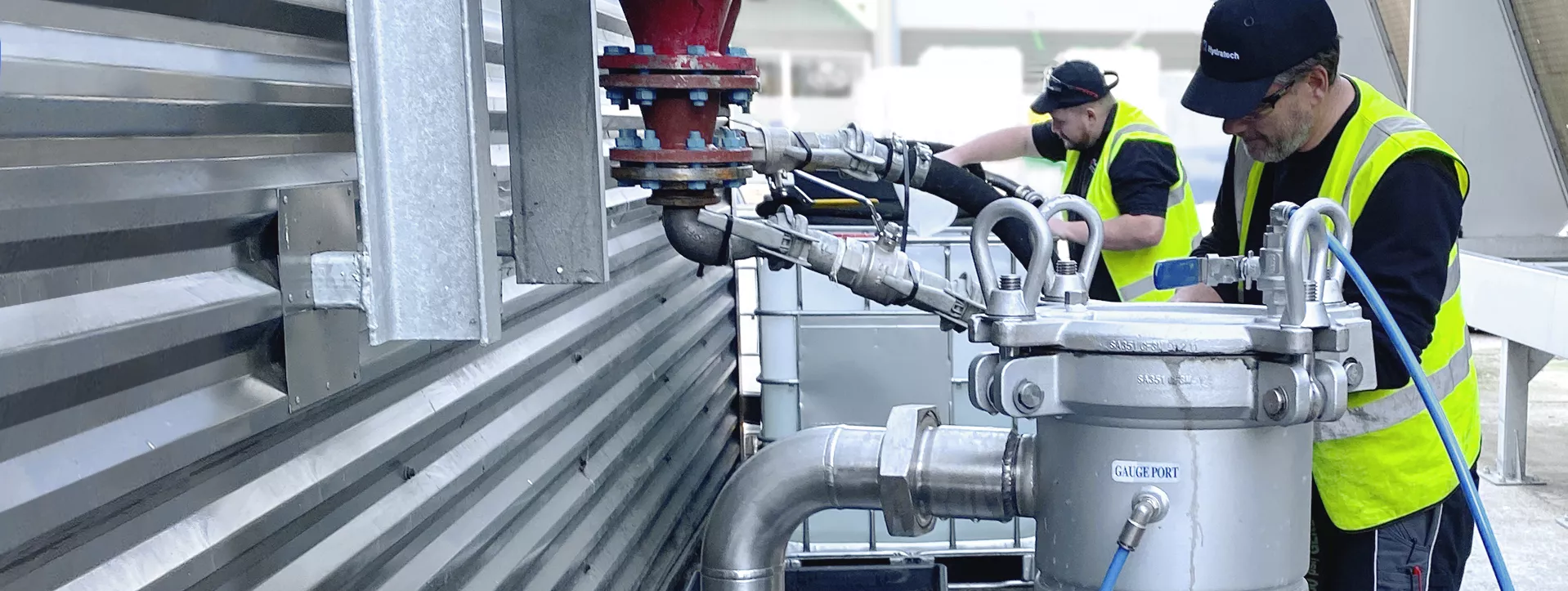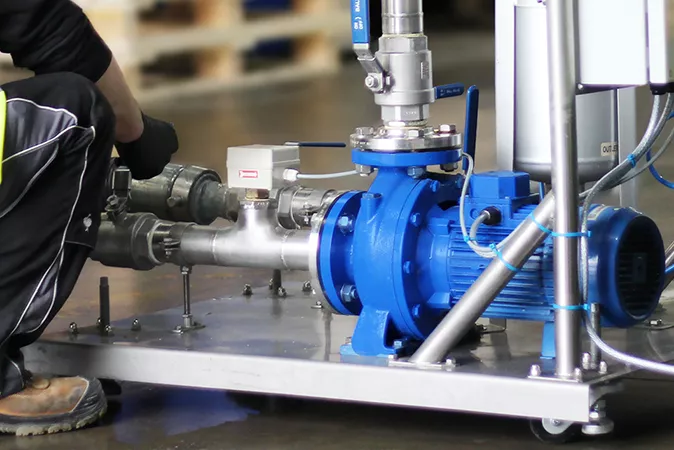Hydratech FMS division provides specialist engineering and maintenance services to customers installing, commissioning, operating or optimising large cooling and heating systems.
More about Hydratech ServicesA key objective since Hydratech's formation in 1998, has been the establishment of technical partnerships with those responsible for plant design, installation and operation. Hydratech work with the likes of Arla, Muller, Saputo and Rodda, to implement a holistic approach to hydronic systems management, which in turn, maximizes the potential for optimized performance, reduced operational costs and significant return on investment gains.
Hydratech’s fully integrated approach to cooling system optimization includes:
Fluid Selection
Heat transfer fluid characteristics (process coolants, secondary refrigerants, glycols etc) have a direct and long-lasting impact on system performance, production output, energy consumption, maintenance and down-time.
Efficient thermal energy transfer, minimal pumping-energy consumption, long-term preservation of pipework/system components, cost, and minimal environmental impact, all need to be considered when selecting the optimum fluid for a dairy cooling system.
Hydratech work with dairy consultants to understand individual system design, thermal and pumping demands. Fluid thermodynamics, toxicity, corrosion chemistry and aerobic bacteria, are all key considerations when selecting an appropriate formulation, mixing ratio and compatible inhibitor package.
Coolflow DTX® process cooling fluid is proven to reduce energy costs by >10% (as verified by Star Technical Services). Introduced in 2010 as a high performance non-toxic secondary refrigerant suitable for replacing propylene glycol in food and cold storage cooling systems, Coolflow DTX® offers numerous operating advantages such as low viscosity, low dose rates and smaller systems and plant footprints onsite.
By retrofitting existing systems - moving from propylene glycol to DTX, many leading food processing plants have reported improved performance and efficiency gains, alongside considerable energy/cost/CO2 savings.
Fluid Maintenance & Monitoring
Based on many years of experience, it is not uncommon for the maintenance of dairy cooling systems to be overlooked. Under such circumstances various issues can develop, including advanced corrosion, biological fouling and sediment formation. All of which will have a direct and negative impact on heat transfer efficiency, pumping performance and energy consumption.
Through combined expertise in water-treatment chemistry, fluid-thermodynamics and mechanical engineering, Hydratech FMS (Fluid Management Services) work with industry leading dairies to ensure cooling systems are compliant, issue free, and running at optimum efficiency.
By taking a proactive approach to fluid analysis, dairy plants can detect issues early and take remedial action before fluid efficiency and system condition are compromised. Even when heat transfer fluids have been carefully selected and commissioned, they can still be prone to degradation - leading to loss of heat transfer capacity, unplanned maintenance and costly shutdowns.
Hydratech’s in-house laboratory carries out analytical fluid testing of cooling system fluids, primarily microbiological and chemistry testing, to identify water contaminates, bacterial presence, water treatment levels or the make-up of elements. For more information email: info@hydratech.co.uk
Case study
Via fluid sampling and analysis at a major UK dairy, Hydratech were able to detect process contamination of milk/fats in the chilled water system.
Issues associated with the contamination included a decrease in heat transfer at primary and process heat exchangers (HX), system blockages and flow inefficiencies. The fluid analysis also identified a degrading glycol/water condition.
Hydratech began remedial work by running further tests at their lab, along with a series of laboratory experiments and a bespoke R&D program. Service engineers provided the dairy plant with a comprehensive proposal, including site works for the removal of process contaminants, system modifications to improve performance, and a fluid retrofit to deliver significant energy savings.
The dairy’s CHW system is now issue free - reporting a 17% reduction in energy consumed by the main coolant circulation pumps and process cooling systems. There has also been a noticeable reduction in running time and load on their primary refrigerant compressors, which they believe will considerably prolong the life span of their system.
A Planned Preventative Maintenance program is also in place with Hydratech Services, to preserve water and system condition, maintain efficiency, reduce risk, and avoid unplanned remedial work.
Heat Recovery
Many dairies have adopted heat recovery to help them achieve their efficiency and sustainability objectives. Incorporating a heat recovery system, to capture the heat removed from the milk by the refrigeration unit/plate cooler is an ideal energy efficient way to heat water at the dairy plant. The treatment and management of these waters is vitally important, if process efficiency is to be optimized and operating costs minimized. Hydratech products (glycols, inhibitors and cleansers) are used in numerous heat recovery systems by the UK’s leading food processing plants and supply chains.
















